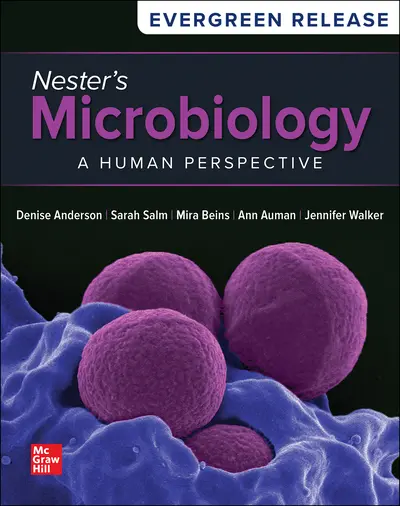Denise G. Anderson
Denise Anderson is a Senior Lecturer in the Department of Microbiology at the University of Washington, where she teaches a variety of courses including general microbiology, medical bacteriology laboratory, and medical mycology/parasitology laboratory. Equipped with a diverse educational background, including undergraduate work in nutrition and graduate work in food science and in microbiology, she first discovered a passion for teaching when she taught microbiology laboratory courses as part of her graduate training. Her enthusiastic teaching style, fueled by regular doses of Seattle’s famous coffee, receives high reviews by her students. Outside of academic life, Denise relaxes in the Phinney Ridge neighborhood of Seattle, where she lives with her husband, Richard Moore, and dog, Dudley (neither of whom are well trained). When not planning lectures, grading papers, or writing textbook chapters, she can usually be found chatting with the neighbors, fighting the weeds in her garden, or enjoying a fermented beverage at the local pub.
Sarah Salm
Sarah Salm is a Professor at the Borough of Manhattan Community College (BMCC) of the City University of New York, where she teaches microbiology, anatomy and physiology, and general biology. She earned her undergraduate and doctoral degrees at the University of the Witwatersrand in Johannesburg, South Africa. She later moved to New York, working first as a postdoctoral fellow and then an Assistant Research Professor at NYU Langone Medical Center. Her research has covered a range of subjects, from plant virus identification through prostate stem cell characterization. When not focused on the textbook and her classes, Sarah loves to read, hike, and travel.
Mira Beins
Mira Beins is an Associate Teaching Professor in the Department of Microbiology at the University of Washington, where she teaches general microbiology, medical bacteriology, and medical mycology/parasitology. She completed her undergraduate studies in Molecular Biology and Biotechnology at the University of the Philippines before moving to Wisconsin for graduate work in Microbiology. Her graduate and postdoctoral research both focused on virology, which solidified her belief that viruses are amazing—although she now begrudgingly admits that bacteria, fungi, and eukaryotic parasites are pretty cool, too. Mira lives in Seattle with her husband Mike and two kids, Maya and Noah. When she’s not busy teaching or driving the kids to their many activities, she enjoys reading books, watching movies, hanging out with friends and family, and planning the next family trip (which Denise hopes will be to the Yorkshire Dales!).
Ann Auman
Ann Auman is a Professor of Biology at Pacific Lutheran University (PLU) in Tacoma, WA. After earning her undergraduate degrees in microbiology and molecular and cell biology from the Pennsylvania State University, Ann completed a PhD in microbiology at the University of Washington. There, her thesis research included analyzing microbial communities using culture-independent methods. During her 20+ year teaching career, Ann has primarily taught microbiology and introductory biology courses. As a microbial ecologist, Ann’s professional interests focus on understanding microbes’ many contributions to global processes as well as the products they make that may be of biotechnological significance. Ann lives in Kent, WA, with her partner Jeff and is now preparing for an empty nest as her two kids, Rebecca and Josh, transition into their next phases of life. Away from campus, she enjoys hanging out with her kids, going on walks with her partner and friends, reading and discussing books, and traveling (which Denise hopes will include a visit to the Yorkshire Dales!).
Jennifer Walker
Jennifer Walker is a Senior Lecturer and the Undergraduate Coordinator for the Microbiology Department at the University of Georgia. Jennifer earned her B.S. in biology at UGA and then fell in love with microbiology after working as a lab technician for a year. She promptly returned to UGA to earn her PhD while studying peptide drug stability motifs and the Gram-negative biotin uptake system as a potential transporter for peptide antimicrobials. While
working as a teaching assistant, Jennifer discovered her passion for education and thus combined her love of microbiology with instruction. Along with teaching introductory and upper-level undergraduate microbiology courses, Jennifer works with an amazing team of faculty and staff that mentor and challenge microbiology students to pursue their dreams. Jennifer lives in Watkinsville with her husband, John, and her four teenage daughters. You can find Jennifer and her family in the fall rooting for the Dawgs at Saturday football games. She also enjoys sewing and working on her yard if she’s not attending a pole vault meet, musical performance, volleyball scrimmage, or church event with her family.
